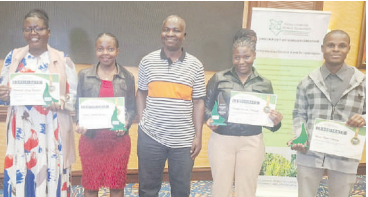

Outstanding biotechnology students from three Kenyan universities have been feted in an event organised by the Kenya University Biotechnology Consortium.
During the event, Kubico also announced plans to revamp its Youth Wing to popularise biotechnology across campuses. This came as scientists and academic leaders urged stronger support for emerging biotech innovations, youth involvement and policy reform to unlock the full potential of the industry.
Prof Richard Oduor, the registrar in charge of research at Kenyatta University, said the future of biotechnology is rapidly advancing, with growing interest and innovation across disciplines.
“We are seeing new innovations emerging in the 21st century,” Oduor said. “We want to encourage young people to start appreciating these trends and adopt them.”
He was speaking at the award ceremony recognising top-performing biotechnology students from Egerton University, KU and the University of Nairobi.
The professor of Molecular and Cell Biology noted a growing interest in biotechnology-related courses.
“There’s a significant rise in student applications for programmes like biotechnology, biomedical engineering and food informatics. These are courses that require high academic performance and are increasingly popular among top students,” he said.
The Kenya Universities and Colleges Central Placement Service has opened admissions for 2024 Form Four candidates and institutions are reporting a surge in inquiries around biotechnology and related fields.
“We need more organised discussions around biotechnology. It’s not just about science in the lab, it’s about building a system that supports innovation,” Oduor added.
He raised concerns about the impact of the GMO ban in Kenya on future job prospects for graduates in the field.
“It’s unfortunate. We are admitting top students into biotechnology programmes, but when they graduate, judicial constraints make it difficult for them to practice. The courts have become the de facto regulators of biotech. My appeal to the Judiciary is to expedite decisions, so processes like these can be scaled up,” he said.
Despite these challenges, Oduor was optimistic, calling for continued sensitisation of the judiciary, legislators and key stakeholders to ensure informed, balanced conversations around biotech policy.
Egerton University professor Charles Muleke pointed out the broad applications of biotechnology, from medicine to agriculture and the clothing industry.
“We cannot do without biotechnology,” Muleke said.
“Medicine, vaccines, improved agriculture, even the clothes we wear, it’s all biotechnology. It brings together biology, chemistry and biochemistry to create solutions for humanity.”
The Molecular parasitology and immunology professor said improving agricultural productivity is critical for feeding Kenya’s growing population.
“We need to increase food production and we can’t rely on traditional methods. Modern biotech offers tools like artificial insemination, improved animal feeds, better fertilisers and disease-resistant crops to boost productivity,” he explained, adding that training the youth in these technologies is crucial for long-term national development.
Dr Joel Ochieng, who leads the Biotechnology Programme at the UoN and serves as Kubico’s secretary general, said while the awards honoured students from the three universities, there are plans to expand to more institutions in 2026.
“This year, we inaugurated the awards by recognising top-performing students from the University of Nairobi, Kenyatta University and Egerton University,” he said.
“Next year, we plan to include JKUAT, Masinde Muliro and Maseno Universities, with the goal of eventually bringing all institutions together under one national award.”
The awards are aimed at showing that biotechnology is a promising field, not just for employment, but for innovation and enterprise.
“Young people don’t have to wait
to be employed. They can create jobs,
develop solutions and contribute
meaningfully to national food
security,” he said.











